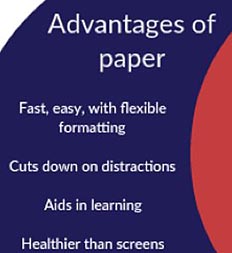Want to be More Productive? Don’t Go Paperless.
![]() Print this Article | Send to Colleague
Print this Article | Send to Colleague
In an article featured earlier this month on the Doist (Santiago, Chile) sponsored online journal and professional blog, ToDoist, some very key points were made to the website's audience of young adult professionals in the software industry about the use of paper, which seems to sometimes alienate them. The author made note that paper has powerful, specific, unique, and probably, for the time being, irreplaceable qualities that cannot be reproduced for such a cost effective price in our lifetime.
Paper doesn’t require booting time, passwords, or fingerprint scanning. Pens and pencils don’t require charging. Field Notes don’t crash. Bic pens are ready to write at a moment’s notice, whether you have 4G connectivity or not. Cheap spiral notebooks don’t need a lightning cable or a power brick.
Paper doesn’t require booting time, passwords, or fingerprint scanning. Pens and pencils don’t require charging. Field Notes don’t crash. Bic pens are ready to write at a moment’s notice, whether you have 4G connectivity or not. Cheap spiral notebooks don’t need a lightning cable or a power brick.
With paper, there’s no system to learn; no hot keys to memorize. Formatting is decided by the user and can be changed in an instant.
No quick entry system developed today can begin to compete with the access that a pocket notebook offers (not the "screen-off memo" option on Samsung’s Galaxy Note 5 nor the Surface Pro 4’s eraser clicking quick note). No virtual assistant can offer us the same versatility. Siri, Cortana and Google Now can’t doodle. Alexa can’t even leave the house.
As author Patrick McLean said, "a pen and paper has but one functionality. It captures the marks I make so that they can be referred to at a later time."

Paper cuts out distractions:
Our Leuchtturm1917 notebooks don’t ring when someone calls. Our Rhodia dot pads don’t vibrate when someone types us on Snapchat. Midori Traveller’s don’t pop up new tweets or Facebook invites to events we will never attend. We can’t fall down a Wikipedia rabbit hole when using a yellow legal pad. Fisher Space Pens can write upside down and underwater but they won’t let you add things to your Amazon wishlist.
Instead, paper restricts us to single-tasking, which has numerous advantages of its own.
It helps us learn.
We also know that writing is more effective for learning and remembering. Something about the mechanics of handwriting stimulates our memory in a way that typing does not. In her book Write It Down, Make it Happen, Henriette Anne Klauser explains:
 Writing triggers the RAS [Reticular Activating System], which in turn sends a signal to the cerebral cortex: ‘Wake up! Pay attention! Don’t miss this detail!’ Once you write down a goal, your brain will be working overtime to see you get it, and will alert you to the signs and signals that [...] were there all along.
Writing triggers the RAS [Reticular Activating System], which in turn sends a signal to the cerebral cortex: ‘Wake up! Pay attention! Don’t miss this detail!’ Once you write down a goal, your brain will be working overtime to see you get it, and will alert you to the signs and signals that [...] were there all along.Similarly, three studies published in the journal Psychological Science found that students who took notes by hand performed significantly better on conceptual questions than students who took notes on their laptops. Researchers Pam Mueller and Daniel Oppenheimer concluded that:
...[L]aptop note takers’ tendency to transcribe lectures verbatim rather than processing information and reframing it in their own words is detrimental to learning.
It’s healthier.
The screens we stare at all day are also ruining our eyes. We all know this; we can feel it in the burning redness of long days. And, while text and images seem to be solid and un-moving, they are, in fact, continually flickering; flashing thousands of times a minute like strobe lights on amphetamines.
The brightness and color temperatures of our screen can disrupt our circadian rhythms and, in turn, disrupt our sleep. Abnormal circadian rhythms lead to insomnia and have been linked to obesity, diabetes, depression, bipolar disorder, and seasonal affective disorder.
More information can be found in the full article available online.


